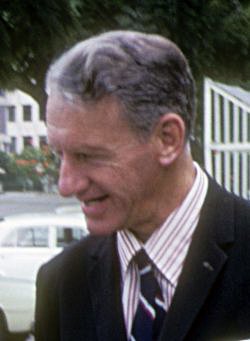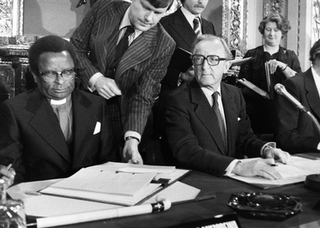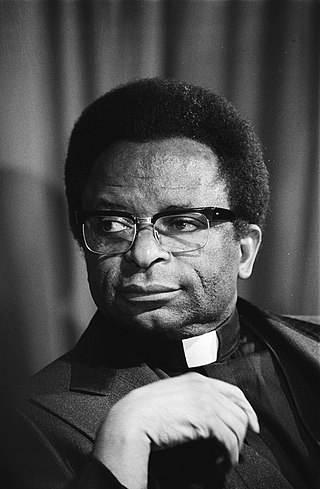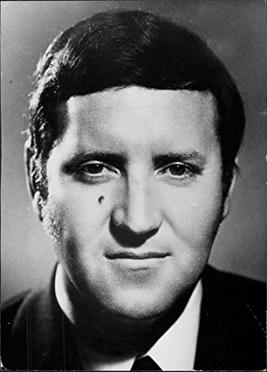
Ian Douglas Smith was a Rhodesian politician, farmer, and fighter pilot who served as Prime Minister of Rhodesia from 1964 to 1979. He was the country's first leader to be born and raised in Rhodesia, and led the predominantly white government that unilaterally declared independence from the United Kingdom in November 1965 in opposition to the UK's demands for the implementation of majority rule as a condition for independence. His 15 years in power were defined by the country's international isolation and involvement in the Rhodesian Bush War, which pitted Rhodesia's armed forces against the Soviet- and Chinese-funded military wings of the Zimbabwe African National Union (ZANU) and Zimbabwe African People's Union (ZAPU).

Zimbabwe Rhodesia, alternatively known as Zimbabwe-Rhodesia, also informally known as Zimbabwe or Rhodesia, was a short-lived sovereign state that existed from 1 June 1979 to 18 April 1980, though lacked international recognition. Zimbabwe Rhodesia was preceded by another state named the Republic of Rhodesia and was briefly under a British-supervised transitional government sometimes referred to as a reestablished Southern Rhodesia, which according to British constitutional theory had remained the lawful government in the area after Unilateral Declaration of Independence (UDI) in 1965. About three months later, the re-established colony of Southern Rhodesia was granted internationally-recognized independence within the Commonwealth as the Republic of Zimbabwe.

The Lancaster House Agreement refers to an agreement signed on 21 December 1979 in Lancaster House, following the conclusion of a constitutional conference where different parties discussed the future of Zimbabwe Rhodesia, formerly known as Rhodesia. The agreement effectively concluded the Rhodesian Bush War. It also marked the nullification of Rhodesia's Unilateral Declaration of Independence, as British colonial authority was to be restored for a transition period, during which free elections under supervision by the British government would take place. Crucially, ZANU and ZAPU, the political wings of ZANLA and ZIPRA would be permitted to stand candidates in the forthcoming elections. This was however conditional to compliance with the ceasefire and the verified absence of voter intimidation.

Abel Tendekayi Muzorewa, also commonly referred to as Bishop Muzorewa, was a Zimbabwean bishop and politician who served as the first and only Prime Minister of Zimbabwe Rhodesia from the Internal Settlement to the Lancaster House Agreement in 1979. A United Methodist Church bishop and nationalist leader, he held office for only a few months.

The prime minister of Rhodesia was the head of government of Rhodesia. Rhodesia, which had become a self-governing colony of the United Kingdom in 1923, unilaterally declared independence on 11 November 1965, and was thereafter an unrecognized state until 1979. In December 1979, the country came under temporary British control, and in April 1980 the country gained recognized independence as Zimbabwe.

The Internal Settlement was an agreement which was signed on 3 March 1978 between Prime Minister of Rhodesia Ian Smith and the moderate African nationalist leaders comprising Bishop Abel Muzorewa, Ndabaningi Sithole and Senator Chief Jeremiah Chirau. After almost 15 years of the Rhodesian Bush War, and under pressure from the sanctions placed on Rhodesia by the international community, and political pressure from South Africa, the United Kingdom, and the United States, the Rhodesian government met with some of the internally based moderate African nationalist leaders in order to reach an agreement on the political future for the country.
The following lists events that happened during 1975 in the Republic of Rhodesia.

General elections were held in Southern Rhodesia between 14 February and 4 March 1980 to elect the members of the House of Assembly of the first Parliament of the independent Zimbabwe. As stipulated by the new Constitution of Zimbabwe produced by the Lancaster House Conference, the new House of Assembly was to comprise 100 members, 80 of whom would be elected proportionally by province by all adult citizens on a common roll, and 20 of whom would be elected in single-member constituencies by whites on a separate roll.
The following lists events that happened during 1971 in Rhodesia.
The following lists events that happened during 1974 in Rhodesia.

The prime minister of Zimbabwe was a political office in the government of Zimbabwe that existed on two occasions. The first person to hold the position was Robert Mugabe from 1980 to 1987 following independence from the United Kingdom. He took office when Southern Rhodesia became the Republic of Zimbabwe on 18 April 1980. This position was abolished when the constitution was amended in 1987 and Mugabe became president of Zimbabwe, replacing Canaan Banana as the head of state while also remaining the head of government. The office of prime minister was restored in 2009 and held by Morgan Tsvangirai until the position was again abolished by the 2013 Constitution of Zimbabwe.

Israel–Zimbabwe relations refers to foreign relations between Israel and Zimbabwe. Neither country has a resident ambassador.

The president of Zimbabwe Rhodesia was the head of state of Zimbabwe Rhodesia. Like the country itself, it was never internationally recognized.

The Victoria Falls Conference took place on 26 August 1975 aboard a South African Railways train halfway across the Victoria Falls Bridge on the border between the unrecognised state of Rhodesia and Zambia. It was the culmination of the "détente" policy introduced and championed by B. J. Vorster, the Prime Minister of South Africa, which was then under apartheid and was attempting to improve its relations with the Frontline States to Rhodesia's north, west and east by helping to produce a settlement in Rhodesia. The participants in the conference were a delegation led by the Rhodesian Prime Minister Ian Smith on behalf of his government, and a nationalist delegation attending under the banner of Abel Muzorewa's African National Council (UANC), which for this conference also incorporated delegates from the Zimbabwe African National Union (ZANU), the Zimbabwe African People's Union (ZAPU) and the Front for the Liberation of Zimbabwe (FROLIZI). Vorster and the Zambian President Kenneth Kaunda acted as mediators in the conference, which was held on the border in an attempt to provide a venue both sides would accept as neutral.

The modern political history of Zimbabwe starts with the arrival of white people to what was dubbed Southern Rhodesia in the 1890s. The country was initially run by an administrator appointed by the British South Africa Company. The prime ministerial role was first created in October 1923, when the country achieved responsible government, with Sir Charles Coghlan as its first Premier. The third Premier, George Mitchell, renamed the post Prime Minister in 1933.

Rowan Cronjé was a Rhodesian politician who served in the cabinet under prime ministers Ian Smith and Abel Muzorewa, and was later a Zimbabwean MP. He emigrated to South Africa in 1985 and served in the government of Bophuthatswana.

This list includes ministers of the cabinet of Rhodesia from 11 November 1965, the date of Rhodesia's Unilateral Declaration of Independence, to 1979. It includes ministers of Rhodesia's transitional government, which began following the 1978 Internal Settlement and ended with the establishment of Zimbabwe Rhodesia on 1 June 1979. The internal transitional government included the creation of a four-person "Executive Council" and the appointment of black co-ministers to cabinet portfolios.

David Colville Smith was a farmer and politician in Rhodesia and its successor states, Zimbabwe Rhodesia and Zimbabwe. He served in the cabinet of Rhodesia as Minister of Agriculture from 1968 to 1976, Minister of Finance from 1976 to 1979, and Minister of Commerce and Industry from 1978 to 1979. From 1976 to 1979, he also served Deputy Prime Minister of Rhodesia. He continued to serve as Minister of Finance in the government of Zimbabwe Rhodesia in 1979. In 1980, he was appointed Minister of Trade and Commerce of the newly independent Zimbabwe, one of two whites included in the cabinet of Prime Minister Robert Mugabe.
Ernest Leonard Bulle was an academic and politician who served as a minister in the governments of Rhodesia and Zimbabwe Rhodesia. He served in the cabinet of Rhodesia as joint Minister of Finance and Minister of Commerce and Industry alongside David Smith from 1978 to 1979 as part of the country's Internal Settlement. He continued as commerce minister in the government of Zimbabwe Rhodesia between June and December 1979. First elected to parliament in the 1979 Zimbabwe Rhodesia general election, he stood unsuccessfully in the 1980 general election, which set the membership of the first parliament of the independent Zimbabwe. Bulle was a member of the United African National Council and served as the party's second vice-president.
Zimbabwe House, formerly called Independence House and Dzimbahwe, is an official residence of the President of Zimbabwe in Harare, Zimbabwe. It was built in 1910 as was used as the house of the Prime Minister of Southern Rhodesia, Prime Minister of Rhodesia, Prime Minister of Zimbabwe Rhodesia and Prime Minister of Zimbabwe.














